华南理工大学电子商务理论与应用2007-2018年考研初试真题
- 格式:pdf
- 大小:3.12 MB
- 文档页数:73
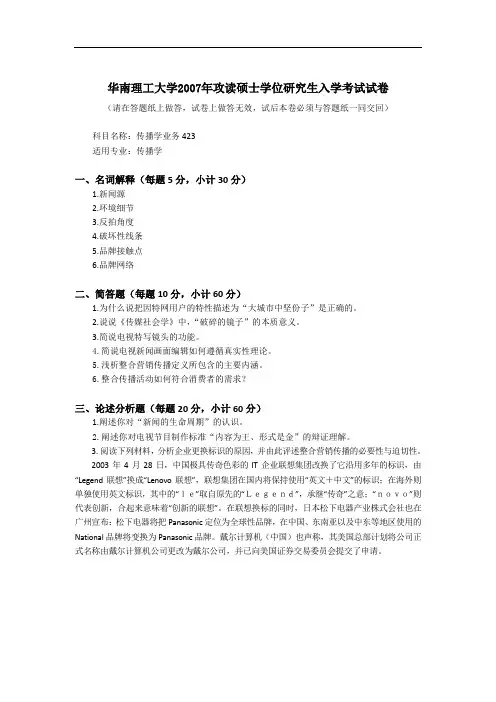
华南理工大学2007年攻读硕士学位研究生入学考试试卷(请在答题纸上做答,试卷上做答无效,试后本卷必须与答题纸一同交回)科目名称:传播学业务423适用专业:传播学一、名词解释(每题5分,小计30分)1.新闻源2.环境细节3.反拍角度4.破坏性线条5.品牌接触点6.品牌网络二、简答题(每题10分,小计60分)1.为什么说把因特网用户的特性描述为“大城市中坚份子”是正确的。
2.说说《传媒社会学》中,“破碎的镜子”的本质意义。
3.简说电视特写镜头的功能。
4.简说电视新闻画面编辑如何遵循真实性理论。
5.浅析整合营销传播定义所包含的主要内涵。
6.整合传播活动如何符合消费者的需求?三、论述分析题(每题20分,小计60分)1.阐述你对“新闻的生命周期”的认识。
2.阐述你对电视节目制作标准“内容为王、形式是金”的辩证理解。
3.阅读下列材料,分析企业更换标识的原因,并由此评述整合营销传播的必要性与迫切性。
2003年4月28日,中国极具传奇色彩的IT企业联想集团改换了它沿用多年的标识,由“Legend联想”换成“Lenovo联想”,联想集团在国内将保持使用“英文+中文”的标识;在海外则单独使用英文标识,其中的“le”取自原先的“Legend”,承继“传奇”之意;“novo”则代表创新,合起来意味着“创新的联想”。
在联想换标的同时,日本松下电器产业株式会社也在广州宣布:松下电器将把Panasonic定位为全球性品牌,在中国、东南亚以及中东等地区使用的National品牌将变换为Panasonic品牌。
戴尔计算机(中国)也声称,其美国总部计划将公司正式名称由戴尔计算机公司更改为戴尔公司,并已向美国证券交易委员会提交了申请。
历年考研真题试卷答案解析华南理工大学2007年攻读硕士学位研究生入学考试试卷答案解析(请在答题纸上做答,试卷上做答无效,试后本卷必须与答题纸一同交回)科目名称:传播学业务423适用专业:传播学一、名词解释(每题5分,小计30分)1.新闻源【考查重点】本题着重考查网络传播学理论,对于相关的网络传播学的概念理论,考生应该多加注意相关的理论。
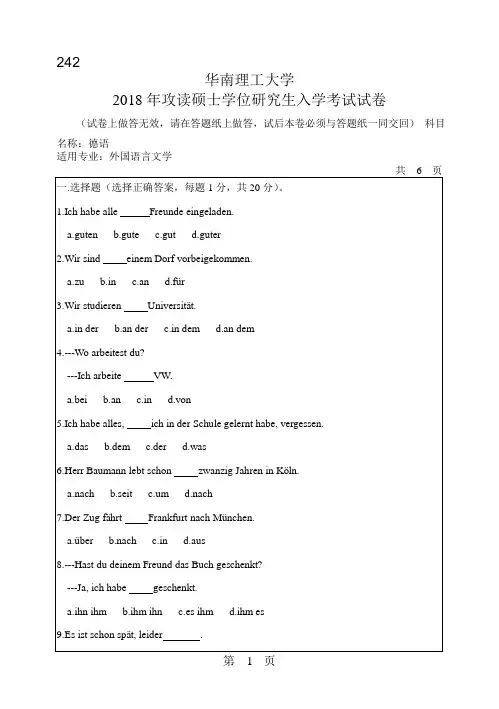
242华南理工大学2018 年攻读硕士学位研究生入学考试试卷(试卷上做答无效,请在答题纸上做答,试后本卷必须与答题纸一同交回)科目名称:德语适用专业:外国语言文学Firma Konti-Elektro.Ja, da war ich 14 Monate. Die ganze Zeit immer nur Akkordarbeit. Ich weiß nicht, aber dann haben die wohl keinen guten Absatz mehr gehabt. Da kam die Firma Siemens und auch einige neue Chefs. Da wurde alles ander-schlechter. Zum Beispiel haben wir bei der Akkordarbeit vorher fünf Minuten für ein Stück gehabt. Als Siemens kam, wurden die Zeiten auf zwei Minuten herabgesetzt. Aber wir haben daher weniger verdient als vorher,mußten aber schneller arbeiten und mehr Stücke machen. Das waren Teile für Elektrogeräte. Dann waren die Kontrolleute nicht mit der Qualität zufrieden. Wir haben gesagt, daß wir in fünf Minuten gute Arbeit machen können, aber nicht in zwei Minuten... Da sagt der Kontrolleur, daßwir dann länger an einem Stück arbeiten müssen, fünf Minuten oder vielleicht zehn Minuten. Wenn wir das machten, hatten wir auch weniger Geld. In zehn Minuten schaffst du natürlich nichts. Darum haben wir gekündigt---vier Kollegen aus der Türkei. Einer sagte, wir gehen jetzt nach Berlin. Ich wollte in Berlin auch als Dreher arbeiten, aber die Fabrik suchte nur Leute für Schichtarbeit. So habe ich mit Schichtarbeit angefangen.Als meine Frau nach Berlin kam, waren wir gleich auf dem Wohnungsamt. Da haben sie gesagt, für Ausländer gibt es keine Wohnung. Natürlich, viele kommen vom Dorf in der Türkei und sind vielleicht zu laut. Aber ich habe schon Deutsche gesehen, die sind genauso laut.Jetzt haben wir in der Kantstraße eine Wohnung. Wohnung kann ich nicht sagen, nur zwei Zimmer und eine Küche für meine Tochter, meine Frau und mich. Toilette ist eine Treppe tiefer, aber das ist nicht schlimm. Schlimm ist, daß wir nur zwei Zimmer haben.Jetzt schicke ich jeden Monat 200 bis 300 Euro an meine Eltern in Istanbul. Wie lange wir in Deutschland bleiben, das weißich noch nicht. Pläne haben wir noch nicht gemacht. Wenn ich Geld gespart habe, dann kann ich in Istanbul ein Geschäft aufmachen.Es ist sehr schlecht, dass viele von uns sich nicht richtig verstehen, wisssen Sie. In derFabrik, auf der Straße und im Geschäft. Aber es ist so, daß viele gar nicht Deutsch lernen wollen. Sie sagen, warum? Sie bleiben zwei Jahre, drei Jahre, dann fahren sie wieder zurück. Ich habe viel mit deutschen Kollegen zusammengearbeitet und gut Deutsch gelernt. Aber in den Abteilungen, wo nur Türkei arbeiten, da lernen sie nichts. Eine ganze Abteilung nur Türkei---die denken nicht daran, wo sie sind. Zuerst waren überall nur Schilder in Deutsch: Einschalten! Außschalten! Vorsicht! Nicht rauchen! Und so. Da konnte keiner wissen, was das heißt. Dann haben sie die Schilder in Türkisch angemacht---auch die Schilder für Unfallverhütung. Aber viele können nicht lesen bei uns. Sie machen etwas falsch, dann passieren viele Unfälle.Welche Aussagen sind auf der Grundlage des Textes richtig(r), welche sind falsch(f)?1.Hassan ist schon seit 17 Jahren mit seiner Frau in Deutschland.( )2.Er ist nur aus dem einen Grund nach Deutschland gekommen, um mehr Geld zu verdienen. ( )3.Seine erste Stelle bekam Hassan in Frankfurt bei Telefunken. ( )4.Weil die Firma Konti-Elektro ihr Produkte nicht mehr gut verkaufen konnte, wurde sie von Siemens übernommen. ( )5.Die Arbeit bei Konti-Elektro gefiel ihm besser, da er dort im Akkord arbeiten konnte. ( )6.Weil die Arbeiter bei Siemens schneller arbeiten mußten, konnten sie mehr Geld verdienen. ( )7.Viele Deutsche vermieten nicht gern an Ausländer, weil diese nach Meinung der Deutschen fast immer zu viel Lärm machen. ( )8.Mit seiner Wohnung kann Hassan zufrieden sein. ( )9.Er weiß noch nicht, wann er wieder nach Istanbul zurückkehren wird. ( )10.D urch die schlechten Sprachkenntnisse der Gastarbeiter entstehen bei der Arbeit viele Probleme. ( )四.将下列句子翻译成德语(每题2 分,共20 分)。
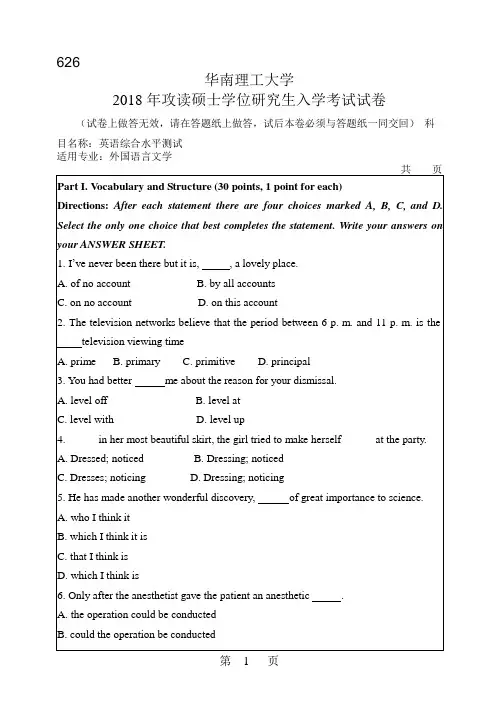
626华南理工大学2018 年攻读硕士学位研究生入学考试试卷(试卷上做答无效,请在答题纸上做答,试后本卷必须与答题纸一同交回)科目名称:英语综合水平测试适用专业:外国语言文学performances. Rather than playing tricks with alternatives presented to participants, we secretly altered the outcomes of their choices, and recorded how they react. For example, in an early study we showed our volunteers pairs of pictures of faces and asked them to choose the most attractive. In some trials, immediately after they made their choice, we asked people to explain the reasons behind their choices.Unknown to them, we sometimes used a double-card magic trick to secretly exchange one face for the other so they ended up with the face they did not choose. Common sense dictates that all of us would notice such a big change in the outcome of a choice. But the result showed that in 75 per cent of the trials our participants were blind to the mismatch, even offering “reasons” for their“choice”.We called this effect “choice blindness”, echoing change blindness,the phenomenon identified by psychologists where a remarkably large number of people fail to spot a major change in their environment. Recall the famous experiments where X asks Y for directions; while Y is struggling to help, X is switched for Z - and. Y fails to notice. Researchers are still pondering the full implications, but it does show how little information we use in daily life, and undermines the idea that we know what is going on around us.When we set out, we aimed to weigh in on the enduring, complicated debate about self-knowledge and intentionality. For all the intimate familiarity we feel we have with decision making, it is very difficult to know about it from the “inside”: one of the great barriers for scientific research is the nature of s ubjectivity.As anyone who has ever been in a verbal disagreement can prove, people tend to give elaborate justifications for their decisions, which we have every reason to believe are nothing more than rationalizations after the event. To prove such people wrong, though, or even provide enough evidence to change their mind, is an entirely different matter: who are you to say what my reasons are?But with choice blindness we drive a large wedge between intentions and actions in the mind. As our participants give us verbal explanations about choices they never made, we can show them beyond doubt - and prove it - that what they say cannot be true. So our experiments offer a unique window into confabulation (the story-telling we do to justify things after the fact) that is otherwise very difficult to come by. We can compare everyday explanations with those under lab conditions, looking for such things as the amount of detail in descriptions, how coherent the narrative is, the emotional tone, or even the timing or flow of the speech. Then we can create a theoretical framework to analyse any kind of exchange.This framework could provide a clinical use for choice blindness: for example, two of our ongoing studies examine how malingering might develop into truesymptoms, and how confabulation might play a role in obsessive-compulsive disorder.Importantly, the effects of choice blindness go beyond snap judgments. Depending on what our volunteers say in response to the mismatched outcomes of choices (whether they give short or long explanations, give numerical rating or labeling, and so on) we found this interaction could change their future preferences to the extent that they come to prefer the previously rejected alternative. This gives us a rare glimpse into the complicated dynamics of self-feedback (“I chose this, I publicly said so, therefore I must like it”), which we suspect lies behind the formation of many everyday preferences.We also want to explore the boundaries of choice blindness. Of course, it will be limited by choices we know to be of great importance in everyday life. Which bride or bridegroom would fail to notice if someone switched their partner at the altar through amazing sleight of hand? Yet there is ample territory between the absurd idea of spouse-swapping, and the results of our early face experiments.For example, in one recent study we invited supermarket customers to choose between two paired varieties of jam and tea. In order to switch each participant’s choice without them noticing, we created two sets of “magical” jars, with lids at both ends and a divider inside. The jars looked normal, but were designed to hold one variety of jam or tea at each end, and could easily be flipped over.Immediately after the participants chose, we asked them to taste their choice again and tell us verbally why they made that choice. Before they did, we turned over the sample containers, so the tasters were given the opposite of what they had intended in their selection. Strikingly, people detected no more than a third of all these trick trials. Even when we switched such remarkably different flavors as spicy cinnamon and apple for bitter grapefruit jam, the participants spotted less than half of all s witches.We have also documented this kind of effect when we simulate online shopping for consumer products such as laptops or cell phones, and even apartments. Our latest tests are exploring moral and political decisions, a domain where reflection and deliberation are supposed to play a central role, but which we believe is perfectly suited to investigating using choice blindness.Throughout our experiments, as well as registering whether our volunteers noticed that they had been presented with the alternative they did not choose, we also quizzed them about their beliefs about their decision processes. How did they think they would feel if they had been exposed to a study like ours? Did they think they would have noticed the switches? Consistently, between 80 and 90 per cent of people said that they believed they would have noticed something was wrong.Gervais, discovers a thing called “lying” and what it can get him. Within days, M ark is rich, famous, and courting the girl of his dreams. And because nobody knows what “lying” is? he goes on, happily living what has become a complete and utter farce.It’s meant to be funny, but it’s also a more serious commentary on us all. As Americans, we like to think we value the truth. Time and time again, public-opinion polls show that honesty is among the top five characteristics we want in a leader, friend, or lover; the world is full of sad stories about the tragic consequences of betrayal. At the same time, deception is all around us. We are lied to by government officials and public figures to a disturbing degree; many of our social relationships are based on little white lies we tell each other. We deceive our children, only to be deceived by them in return. And the average person, says psychologist Robert Feldman, the author of a new book on lying, tells at least three lies in the first 10 minutes of a conversation. “There’s always been a lot of lying,” says Feldman,whose new book, The Liar in Your Life, came out this month. “But I do think we’re seeing a kind of cultural shift where we’re lying more, it’s easier to lie, and in some ways it’s almost more acceptable.”As Paul Ekman, one of Feldman’s longtime lying colleagues and the inspiration behind the Fox IV series “Lie To Me” defines it,a liar is a person who “intends to mislead,”“deliberately,” without being asked to do so by the target of the lie. Which doesn’t mean that all lies are equally toxic: some are simply habitual –“My pleasure!”-- while others might be well-meaning white lies. But each, Feldman argues, is harmful, because of the standard it creates. And the more lies we tell, even if th ey’re little white lies, the more deceptive we and society become.We are a culture of liars, to put it bluntly, with deceit so deeply ingrained in our mind that we hardly even notice we’re engaging in it. Junk e-mail, deceptive advertising, the everyday p leasantries we don’t really mean –“It’s so great to meet you! I love that dress”– have, as Feldman puts it, become “a white noise we’ve learned to neglect.” And Feldman also argues that cheating is more common today than ever. The Josephson Institute, a nonprofit focused on youth ethics, concluded in a 2008 survey of nearly 30,000 high school students that “cheating in school continues to be rampant, and it’s getting worse.” In that survey, 64 percent of students said they’d cheated on a test during the past year, up from 60 percent in 2006. Another recent survey, by Junior Achievement, revealed that more than a third of teens believe lying, cheating, or plagiarizing can be necessary to succeed, while a brand-new study, commissioned by the publishers of Feldman’s book, shows that 18-to 34-year-olds--- those of us fully reared in this lying culture --- deceive more frequently than the general population.Teaching us to lie is not the purpose of Feldman’s book. His subtitle, in fact, is “the way to truthful relationships.” But if his book teaches us anything, it’s that we should sharpen our skills — and use them with abandon.Liars get what they want. They avoid punishment, and they win others’ affection. Liars make themselves sound smart and intelligent, they attain power over those of us who believe them, and they often use their lies to rise up in the professional world. Many liars have fun doing it. And many more take pride in getting away with it.As Feldman notes, there is an evolutionary basis for deception: in the wild, animals use deception to “play dead” when threatened. But in the modem world, the motives of our lying are more selfish. Research has linked socially successful people to those who are good liars. Students who succeed academically get picked for the best colleges, despite the fact that, as one recent Duke University study found, as many as 90 percent of high-schoolers admit to cheating. Even lying adolescents are more popular among their peers.And all it takes is a quick flip of the remote to see how our public figures fare when they get caught in a lie: Clinton keeps his wife and goes on to become a national hero. Fabricating author James Frey gets a million-dollar book deal. Eliot Spitzer’s wife stands by his side, while “Appalachian hiker” Mark Sanford still gets to keep his post. If everyone else is being rewarded for lying,don’t we need to lie, too, just to keep up?But what’s funny is that even as we admit to being liars, study after study shows that most of us believe we can tell when others are lying to us. And while lying may be easy, spotting a liar is far from it. A nervous sweat or shifty eyes can certainly mean a person’s uncomfortable, but it doesn’t necessarily mean they’re lying. Gaze aversion, meanwhile, has more to do with shyness than actual deception. Even polygraph machines are unreliable. And according to one study, by researcher Bella DePaulo, we’re only able to differentiate a lie from truth only 47 percent of the time, less than if we guessed randomly. “Basically everything we’ve heard about catching a liar is wrong,” says Feldman, who heads the College of Social and Behavioral Sciences at the University of Massachusetts, Amherst.Ekman, meanwhile, has spent decades studying micro-facial expressions of liars: the split-second eyebrow arch that shows surprise when a spouse asks who was on the phone; the furrowed nose that gives away a hint of disgust when a person says “I love you.” He’s trained everyone from the Secret Service to the TSA, and believes that with close study, it’s possible to identify those tiny emotions. The hard part, of course, is proving them. “A lot of times, it’s easier to believe,” says Feldman. “It takes a lot ofThere were, however, different explanations of this unhappy fact. Sean Pidgeon put the blame on “humanities departments who are responsible for the leftist politics that still turn people off.” Kedar Kulkarni blamed “the absence of a culture that privileges Learning to improve oneself as a human being.” Bethany blamed universities, which because they are obsessed with “maintaining funding” default on th e obligation to produce “well rounded citizens.” Matthew blamed no one,because i n his view the report’s priorities are just what they should be: “When a poet creates a vaccine or a tangible good that can be produced by a Fortune 500 company, I’ll rescind my comment.”Although none of these commentators uses the word, the issue they implicitly raise is justification. How does one justify funding the arts and humanities? It is clear which justifications are not available. You cannot argue that the arts and humanities are able to support themselves through grants and private donations. You cannot argue that a state’s economy will benefit by a new reading of “Hamlet.” You can’t argue -- well you can, but it won’t fly -- that a graduate who is well-versed in the history of Byzantine art will be attractive to employers (unless the employer is a museum). You can talk as Bethany does about “well rounded citizens,” but that ideal belongs to an earlier period, when the ability to refer knowledgeably to Shakespeare or Gibbon or the Thirty Years War had some cash value (the sociologists call it cultural capital). Nowadays, larding your conversations with small bits of erudition is more likely to irritate than to win friends and influence people.At one time justification of the arts and humanities was unnecessary because, as Anthony Kronman puts it in a new book, “Education’s End: Why Our Colleges and Universities Have Given Up on the Meaning of Life,” it was assumed that “a college was above all a place for the training of character, for the nurturing of those intellectual and moral habits that together from the basis for living the best life one can.”It followed that the realization of this goal required an immersion in the great texts of literature, philosophy and history even to the extent of memorizing them, for “to acquire a text by memory is to fix in one’s mind the image and example of the author and his subject.”It is to a version of this old ideal that Kronman would have us return, not because of a professional investment in the humanities (he is a professor of law and a former dean of the Yale Law School), but because he believes that only the humanities can address “the crisis of spirit we now confront” and “restore the wonder which those who have glimpsed the human condition have always felt, and which our scientific civilization, with its gadgets and discoveries, obscures.”As this last quotation makes clear, Kronman is not so much mounting a defense ofthe humanities as he is mounting an attack on everything else. Other spokespersons for the humanities argue for their utility by connecting them (in largely unconvincing ways) to the goals of science, technology and the building of careers. Kronman, however, identifies science, technology and careerism as impediments to living a life with meaning. The real enemies, he declares,are “the careerism that distracts from life as a whole” and “the blind acceptance of science and technology that disguise and deny our human condition.” These false idols,he says,block the way to understanding. We must turn to the humanities if we are to “meet the need for meaning in an age of vast but pointless powers,”for only the humanities can help us recover the urgency of “the question of what living is for.”The humanities do this, Kronman explains, by exposing students to “a range of texts that express with matchless power a number of competing answers to this question.” In the course of this program —Kronman calls it “secular humanism”—students will be moved “to consider which alternatives lie closest to their own evolving sense of self?” As they survey “the different ways of living that have been held up by different authors,” they will be encouraged “to enter as deeply as they can into the experiences, ideas, and values that give each its permanent appeal.” And not only would such a “revitalized humanism” contribute to the growth of the self,it “would put the conventional pieties of our moral and political world in question” and “bring what is hidden into the open — the highest goal of the humanities and the first responsibility of every teache r.”Here then is a justification of the humanities that is neither strained (reading poetry contributes to the state’s bottom line) nor crassly careerist. It is a stirring vision that promises the highest reward to those who respond to it. Entering into a conversation with the great authors of the western tradition holds out the prospect of experiencing “a kind of immortality” and achieving “a position immune to the corrupting powers of time.”Sounds great, but I have my doubts. Does it really work that way? Do the humanities ennoble? And for that matter, is it the business of the humanities, or of any other area of academic study, to save us?The answer in both cases, I think, is no. The premise of secular humanism (or of just old-fashioned humanism) is that the examples of action and thought portrayed in the enduring works of literature, philosophy and history can create in readers the desire to emulate them. Philip Sydney put it as well as anyone ever has when he asks (in “The Defense of Poesy” 1595), “Who reads Aeneas carrying old Anchises on his back that wishes not it was his fortune to perform such an excellent act?” Thrill to this picture of42.What does Anthony Kronman oppose in the process to strive for meaningful life?A.Secular humanism.B. Careerism.C. Revitalized humanismD. Cultural capital.43.Which of the following is NOT mentioned in this article?A.Sidney Carton killed himself.B.A new reading of Hamlet may not benefit economy.C.Faust was not willing to sell his soul.D.Philip Sydney wrote The Defense of Poesy.44.Which is NOT true about the author?A.At the time of writing, he has been in the field of the humanities for 45 years.B.He thinks the humanities are supposed to save at least those who study them.C.He thinks teachers and students of the humanities just learn how to analyze literary effects and to distinguish between different accounts of the foundations of knowledge.D.He thin ks Kronman’s remarks compromise the object its supposed praise.45.Which statement could best summarize this article?A.The arts and humanities fail to produce well-rounded citizens.B.The humanities won’t save us because humanities departments are too leftist.C.The humanities are expected to train character and nurture those intellectual andmoral habits for living a life with meaning.D.The humanities don’t bring about effects in the world but just give pleasure to those who enjoy them.Passage fourJust over a decade into the 21st century, women’s progress can be celebrated across a range of fields. They hold the highest political offices from Thailand to Brazil, Costa Rica to Australia. A woman holds the top spot at the International Monetary Fund; another won the Nobel Prize in economics. Self-made billionaires in Beijing, tech innovators in Silicon Valley, pioneering justices in Ghana—in these and countless other areas, women are leaving their mark.But hold the applause. In Saudi Arabia, women aren’t allowed to drive. In Pakistan, 1,000 women die in honor killings every year. In the developed world, women lag behind men in pay and political power. The poverty rate among women in the U.S. rose to 14.5% last year.To measure the state of women’s progress. Newsweek ranked 165countries, looking at five areas that affect women’s lives; treatment under the law, workforce participation, political power, and access to education and health care. Analyzing datafrom the United Nations and the World Economic Forum, among others, and consulting with experts and academics, we measured 28 factors to come up with our rankings.Countries with the highest scores tend to be clustered in the West, where gender discrimination is against the law, and equal rights are constitutionally enshrined. But there were some surprises. Some otherwise high-ranking countries had relatively low scores for political representation. Canada ranked third overall but 26th in power, behind countries such as Cuba and Burundi. Does this suggest that a woman in a nation’s top office translates to better lives for women in general? Not exactly.“Trying to quantify or measure the impact of women in politics is hard because in very few countries have there been enough women in politics to make a difference,” says Anne-Marie Goetz, peace and security adviser for U.N. Women.Of course, no index can account for everything. Declaring that one country is better than another in the way that it treats more than half its citizens means relying on broad strokes and generalities. Some things simply can’t be measured.And cross-cultural comparisons can t account for difference of opinion.Certain conclusions are nonetheless clear. For one thing, our index backs up a simple but profound statement made by Hillary Clinton at the recent Asia-Pacific Economic Cooperation summit. “When we liberate the economic potential of women, we elevate the economic performance of communities, nations, and the world,”she said. “There’s a simulative effect that kicks in when women have greater access to jobs and the economic lives of our countries: Greater political stability. Fewer military conflicts. More food. More educational opportunity for children. By harnessing the economic potential of all women, we boost opportunity for all people.”46.What does the author think about women’s progress so far?A.It still leaves much to be desired.B.It is too remarkable to be measured.C.It has greatly changed women's fate.D.It is achieved through hard struggle.47.In what countries have women made the greatest progress?A.Where women hold key posts in government.B.Where women’s rights are protected by law.C.Where women’s participation in management is high.D.Where women enjoy better education and health care.48.What do Newsweek rankings reveal about women in Canada?A.They care little about political participation.B.They are generally treated as equals by men.C.They have a surprisingly low social status.D.They are underrepresented in politics.49.What does Anne-Marie Goetz think of a woman being in a nation's top office?A.It does not necessarily raise women's political awareness.B.It does not guarantee a better life for the nation's women.C.It enhances women's status.D.It boosts women's confidence.50.What does Hillary Clinton suggest we do to make the world a better place?A.Give women more political power.B.Stimulate women's creativity.C.Allow women access to education.D.Tap women's economic potential.Passage fiveThe idea that government should regulate intellectual property through copyrights and patents is relatively recent in human history, and the precise details of what intellectual property is protected for how long vary across nations and occasionally change. There are two standard sociological justifications for patents or copyrights: They reward creators for their labor, and they encourage greater creativity. Both of these are empirical claims that can be tested scientifically and could be false in some realms.Consider music. Star performers existed before the 20th century, such as Franz Liszt and Niccolo Paganini, but mass media produced a celebrity system promoting a few stars whose music was not necessarily the best or most diverse. Copyright provides protection for distribution companies and for a few celebrities, thereby helping to support the industry as currently defined, but it may actually harm the majority of performers. This is comparable to Anatole France's famous irony, "The law, in its majestic equality, forbids the rich as well as the poor to sleep under bridges." In theory, copyright covers the creations of celebrities and obscurities equally, but only major distribution companies have the resources to defend their property rights in court. In a sense, this is quite fair, because nobody wants to steal unpopular music, but by supporting the property rights of celebrities, copyright strengthens them as a class in contrast to anonymous musicians.Internet music file sharing has become a significant factor in the social lives of children, who download bootleg music tracks for their own use and to give as gifts to friends. If we are to believe one recent poll done by a marketing firm rather than social。
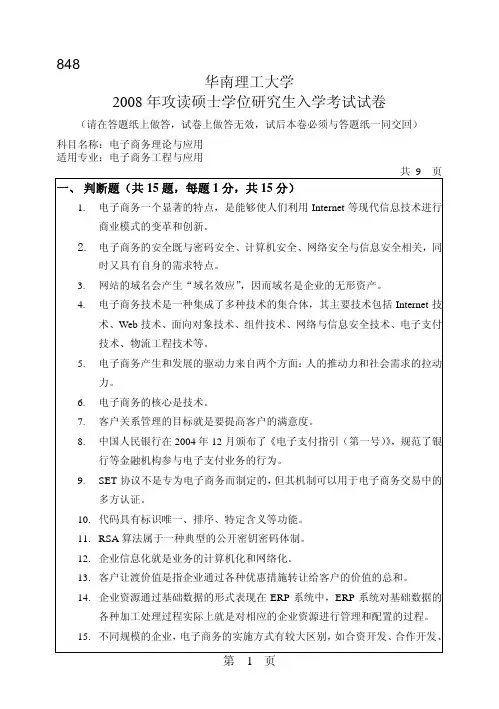
848华南理工大学2008年攻读硕士学位研究生入学考试试卷(请在答题纸上做答,试卷上做答无效,试后本卷必须与答题纸一同交回)科目名称:电子商务理论与应用适用专业:电子商务工程与应用共 9 页一、 判断题(共15题,每题1分,共15分)1.电子商务一个显著的特点,是能够使人们利用Internet等现代信息技术进行商业模式的变革和创新。
2.电子商务的安全既与密码安全、计算机安全、网络安全与信息安全相关,同时又具有自身的需求特点。
3.网站的域名会产生“域名效应”,因而域名是企业的无形资产。
4.电子商务技术是一种集成了多种技术的集合体,其主要技术包括Internet技术、Web技术、面向对象技术、组件技术、网络与信息安全技术、电子支付技术、物流工程技术等。
5.电子商务产生和发展的驱动力来自两个方面:人的推动力和社会需求的拉动力。
6.电子商务的核心是技术。
7.客户关系管理的目标就是要提高客户的满意度。
8.中国人民银行在2004年12月颁布了《电子支付指引(第一号)》,规范了银行等金融机构参与电子支付业务的行为。
9.SET协议不是专为电子商务而制定的,但其机制可以用于电子商务交易中的多方认证。
10.代码具有标识唯一、排序、特定含义等功能。
11.RSA算法属于一种典型的公开密钥密码体制。
12.企业信息化就是业务的计算机化和网络化。
13.客户让渡价值是指企业通过各种优惠措施转让给客户的价值的总和。
14.企业资源通过基础数据的形式表现在ERP系统中,ERP系统对基础数据的各种加工处理过程实际上就是对相应的企业资源进行管理和配置的过程。
15.不同规模的企业,电子商务的实施方式有较大区别,如合资开发、合作开发、委托开发、自主开发等。
对于特大型、大型企业较宜实行自主开发。
二、 单项选择题(共15题,每题1分,共15分)1.网上百科全书的商业模式是A、制造商模式B、动态经纪模式C、社区模式D、订阅模式2.电子政务系统中,是从如何构建与组织网站信息,使用户能更好地找到其所需的信息为目的所开展的规划与设计工作,目的是设计出更好的政府内部与公共网站。
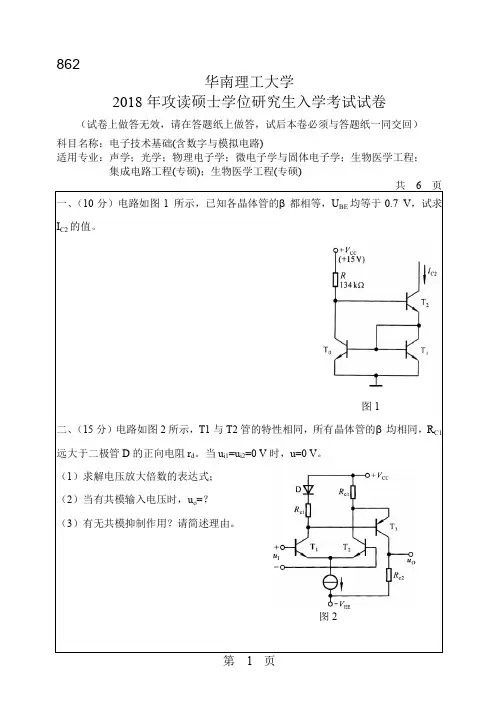
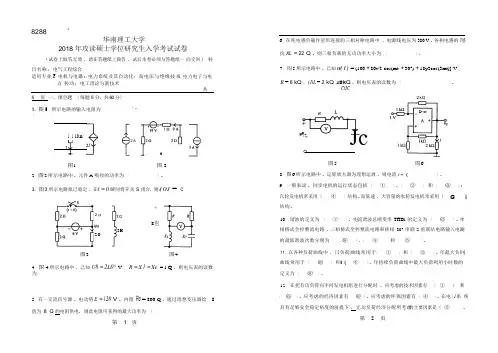
A‘,、6,’-r飞zu 。
8288华南理工大学 6.在纯电感负载作星形连接的三相对称电路中,电源线电压为380V,各相电感的J惑2018 年攻读硕士学位研究生入学考试试卷(试卷上做答无效,请在答题纸上做答,试后本卷必须与答题纸一向交回)科目名称:电气工程综合适用专业F电机与电器:、电力系统及其自动化:高电压与绝缘技术:电力电子与电力传动;电工理论与新技术共5页一、填空题〈每题5 分,共60分〉抗XL=22Q,则三相负载的无功功率大小为()。
7. 图5 所示电路中,己知u( t )= (100 + 80v'2-cos(mt + 30°) + 18y2cos(3mt)] V , R=6kQ,(J)L=2kQ,土=18kQ,则电压表的读数为(〉。
CtJC2 kQl.图l所示电路的输入电阻为(〉。
R L2 A Jc图l 图22.图2所示电路中,元件A吸收的功率为〈)。
3. 图3 所示电路原已稳定,在t = O 瞬间将开关S 闭合,则i( OJ = C+2 {li(t) E 也I H2 0图3图44.图4所示电路中,己知U8 = 2L0°V ,R =X l = Xe=l Q,则电压表的读数为l5.有一交流信号源,电动势E=120V,内阻Ro=800Q,通过理想变压器给I 值为8 Q 的电阻供电,则此电阻可获得的最大功率为(第 1 页图5 图68.图6所示电路中,运算放大器为理想运放,则电流i=()。
9.一般来说,同步电机的运行状态包括(①)、(②〉和(@);汽轮发电机常采用(④〉结构,而低速、大容量的水轮发电机常采用(@)j 结构。
10.谐波的定义为(①〉,电流谐波总畸变率THDi的定义为(@)。
单相桥式全控整流电路、三相桥式全控整流电路和移相30°串联2重联结电路输入电涮的最低谐波次数分别为(@)、(④〉和(⑤)。
11.在各种负荷曲线中,日负荷曲线常用于(①)和(②),年最大负同曲线常用于〈@)和l(④),年持续负荷曲线中最大负荷利用小时数的定义为(@〉。
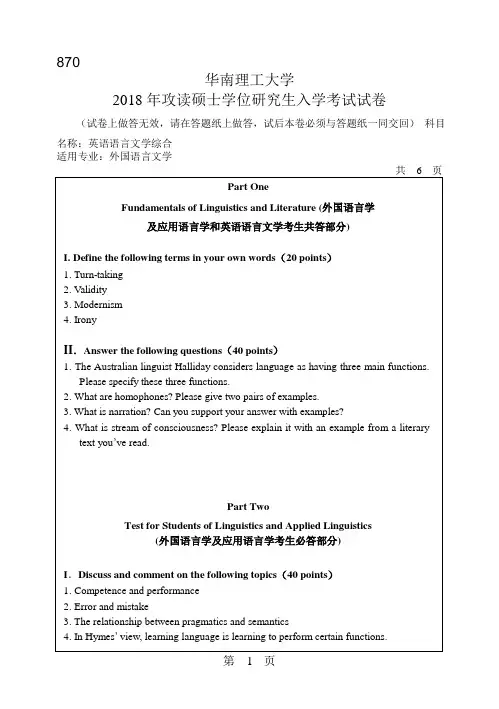
870华南理工大学2018 年攻读硕士学位研究生入学考试试卷(试卷上做答无效,请在答题纸上做答,试后本卷必须与答题纸一同交回)科目名称:英语语言文学综合适用专业:外国语言文学共 6 页Part OneFundamentals of Linguistics and Literature (外国语言学及应用语言学和英语语言文学考生共答部分)I.Define the following terms in your own words(20 points)1.Turn-taking2.Validity3.Modernism4.IronyII.Answer the following questions(40 points)1.The Australian linguist Halliday considers language as having three main functions.Please specify these three functions.2.What are homophones? Please give two pairs of examples.3.What is narration? Can you support your answer with examples?4.What is stream of consciousness? Please explain it with an example from a literarytext you’ve read.Part TwoTest for Students of Linguistics and Applied Linguistics(外国语言学及应用语言学考生必答部分)I.Discuss and comment on the following topics(40 points)petence and performance2.Error and mistake3.The relationship between pragmatics and semantics4.In Hymes’ view, learning language is learning to perform certain functions.II.Analyze the language data according to the requirements(50 points)1.Read the following two passages, and analyze the varieties of language use and thedifferent perspectives on language in an essay of about 250 words. Please back up your idea with the related linguistic theories. (25 points)Passage A:A living language is continually changing, even in a small community. Usually, linguistic changes take place so slowly that it is only by looking back over at least several decades that one can detect changes. The most obvious changes in the language of a large, sophisticated community occur in the field of vocabulary, for in such a community new words are constantly being created and old words discarded.(D. Ward, The Russian Language Today)Passage B:Hampshire: Am I right in thinking − you must correct me if I’m wrong − that your studies of language have led you to the conclusion that there are certain …common … underlying structures common to all languages which constitute something like a universal grammar?Chomsky: Yes. It seems to me that the evidence available to us suggests that there must be some very deep … inborn principles, probably of a highly restrictive nature that determine how knowledge of a language emerges in an individual given the very scattered and degenerate data available to him.Hampshire: Your evidence is derived really from learning, the study of learning language?Chomsky: It seems to me that if you want to study learning in a serious way, what one really has to do is to study a sort of input-output situation. We have an organism of which we know nothing; we know what kind of data is available to it; we can discover that; and the first question we must then try to answer is: what kind of a mental structure does the organism develop when that evidence is presented to it?2.Read and compare the following two passages, and analyze the linguistic structuresand styles in an essay of about 250 words. (25 points)Passage C:We, the peoples of the U. N., determined to save succeeding generations from the scourge of war, which twice in our lifetime has brought untold suffering to mankind, and to reaffirm faith in fundamental rights, in the dignity and worth of the humanperson, in the equal rights of men and women and of nations large and small, and to establish conditions under which justice and respect for the obligations arising from treaties and other sources of international law can be maintained, and to promote social progress and better standards of life in larger freedom, and for these ends, to practice tolerance and live together in peace with one another as good neighbors, and to unite our strength to maintain international peace and security, and to ensure, by the acceptance of principles and the institution of methods, that armed force shall not be used, save in the common interest, and to employ international machinery for the promotion of economic and social advancement of all peoples, have resolved to combine our efforts to accomplish these aims.(The Charter of the United Nations)Passage D:He stepped into the stream. It was a shock. His trousers clung tight to his legs. His shoes felt the gravel. The water was a rising cold shock.…His mouth dry, his heart down, Nick reeled in. He had never seen so big a trout. There was a heaviness, a power not to be held, and then the bulk of him, as he jumped. He looked as broad as a salmon.Nick’s hand was shaky. He reeled in slowly. The thrill had been too much. He felt, vaguely, a little sick, as though it would be better to sit down.(Ernest Hemingway, Big Two-Hearted River)Part ThreeTest for Students of English Language and Literature(英语语言文学考生必答部分)I.Discuss and comment on the following topics(40 points)ment on Hemingway (Code) Heroes.ment on Oedipal Complex in literature.ment on the importance of interior monologue in any literary text written by afemale writer.ment on realism and its significance in literary history.II.Analysis and appreciation(50 points)1.Analyze the following passage from Moby Dick (1851), written by Herman Melville (1819-1891), in an essay of no less than 250 words. (25 points)Now, when I say that I am in the habit of going to sea whenever I begin to grow hazy about the eyes, and begin to be over conscious of my lungs, I do not mean to have it inferred that I ever go to sea as a passenger. For to go as a passenger you must need to have a purse, and a purse is but a rag unless you have something in it. Besides, passengers get sea-sick- grow quarrelsome- don't sleep of nights- do not enjoy themselves much, as a general thing;- no, I never go as a passenger; nor, though I am something of a salt, do I ever go to sea as a Commodore, or a Captain, or a Cook. I abandon the glory and distinction of such offices to those who like them. For my part, I abominate all honorable respectable toils, trials, and tribulations of every kind whatsoever. It is quite as much as I can do to take care of myself, without taking care of ships, barques, brigs, schooners, and what not. And as for going as cook,- though I confess there is considerable glory in that, a cook being a sort of officer on ship-board- yet, somehow, I never fancied broiling fowls;- though once broiled, judiciously buttered, and judgmatically salted and peppered, there is no one who will speak more respectfully, not to say reverentially, of a broiled fowl than I will. It is out of the idolatrous dotings of the old Egyptians upon broiled ibis and roasted river horse, that you see the mummies of those creatures in their huge bake-houses the pyramids.No, when I go to sea, I go as a simple sailor, right before the mast, plumb down into the fore-castle, aloft there to the royal mast-head. True, they rather order me about some, and make me jump from spar to spar, like a grasshopper in a May meadow. And at first, this sort of thing is unpleasant enough. It touches one's sense of honor, particularly if you come of an old established family in the land, the Van Rensselaers, or Randolphs, or Hardicanutes. And more than all, if just previous to putting your hand into the tar-pot, you have been lording it as a country schoolmaster, making the tallest boys stand in awe of you. The transition is a keen one, I assure you, from a schoolmaster to a sailor, and requires a strong decoction of Seneca and the Stoics to enable you to grin and bear it. But even this wears off in time.What of it, if some old hunks of a sea-captain orders me to get a broom and sweep down the decks? What does that indignity amount to, weighed, I mean, in the scales of the New Testament? Do you think the archangel Gabriel thinks anything the less of me, because I promptly and respectfully obey that old hunks in that particular instance? Who ain't a slave? Tell me that. Well, then, however the old sea-captains may order me about- however they may thump and punch me about, I have the satisfaction ofknowing that it is all right; that everybody else is one way or other served in much the same way- either in a physical or metaphysical point of view, that is; and so the universal thump is passed round, and all hands should rub each other's shoulder-blades, and be content.Again, I always go to sea as a sailor, because they make a point of paying me for my trouble, whereas they never pay passengers a single penny that I ever heard of. On the contrary, passengers themselves must pay. And there is all the difference in the world between paying and being paid. The act of paying is perhaps the most uncomfortable infliction that the two orchard thieves entailed upon us. But being paid, - what will compare with it? The urbane activity with which a man receives money is really marvelous, considering that we so earnestly believe money to be the root of all earthly ills, and that on no account can a monied man enter heaven. Ah! how cheerfully we consign ourselves to perdition!Finally, I always go to sea as a sailor, because of the wholesome exercise and pure air of the fore-castle deck. For as in this world, head winds are far more prevalent than winds from astern (that is, if you never violate the Pythagorean maxim), so for the most part the Commodore on the quarter-deck gets his atmosphere at second hand from the sailors on the forecastle. He thinks he breathes it first; but not so. In much the same way do the commonalty lead their leaders in many other things, at the same time that the leaders little suspect it. But wherefore it was that after having repeatedly smelt the sea as a merchant sailor, I should now take it into my head to go on a whaling voyage; this the invisible police officer of the Fates, who has the constant surveillance of me, and secretly dogs me, and influences me in some unaccountable way- he can better answer than anyone else. And, doubtless, my going on this whaling voyage, formed part of the grand programme of Providence that was drawn up a long time ago. It came in as a sort of brief interlude and solo between more extensive performances. I take it that this part of the bill must have run something like this:"Grand Contested Election for the Presidency of the United States."WHALING VOYAGE BY ONE ISHMAEL.""BLOODY BATTLE IN AFFGHANISTAN."Though I cannot tell why it was exactly that those stage managers, the Fates, put me down for this shabby part of a whaling voyage, when others were set down for magnificent parts in high tragedies, and short and easy parts in genteel comedies, and jolly parts in farces- though I cannot tell why this was exactly; yet, now that I recall all the circumstances, I think I can see a little into the springs and motives which being cunningly presented to me under various disguises, induced me to set about performing the part I did, besides cajoling me into the delusion that it was a choice resulting from my own unbiased freewill and discriminating judgment.Chief among these motives was the overwhelming idea of the great whale himself. Such a portentous and mysterious monster roused all my curiosity. Then the wild and distant seas where he rolled his island bulk; the undeliverable, nameless perils of the whale; these, with all the attending marvels of a thousand Patagonian sights and sounds, helped to sway me to my wish. With other men, perhaps, such things would not have been inducements; but as for me, I am tormented with an everlasting itch for things remote. I love to sail forbidden seas, and land on barbarous coasts. Not ignoring what is good, I am quick to perceive a horror, and could still be social with it- would they let me- since it is but well to be on friendly terms with all the inmates of the place one lodges in.By reason of these things, then, the whaling voyage was welcome; the great flood-gates of the wonder-world swung open, and in the wild conceits that swayed me to my purpose, two and two there floated into my inmost soul, endless processions of the whale, and, mid most of them all, one grand hooded phantom, like a snow hill in the air.2.Read the following Sonnet by William Shakespeare (1564-1616), and write an analytical essay in about 250 words. (25 points)Shall I compare thee to a summer's day?Thou art more lovely and more temperate:Rough winds do shake the darling buds of May,And Summer's lease hath all too short a date:Sometime too hot the eye of heaven shines,And often is his gold complexion dimm'd;And every fair from fair sometime declines,By chance, or nature's changing course, untrimm'd:But thy eternal summer shall not fadeNor lose possession of that fair thou owest;Nor shall death brag thou wander'st in his shadeWhen in eternal lines to time thou growest:So long as men can breathe or eyes can see,So long lives this and this gives life to thee.。
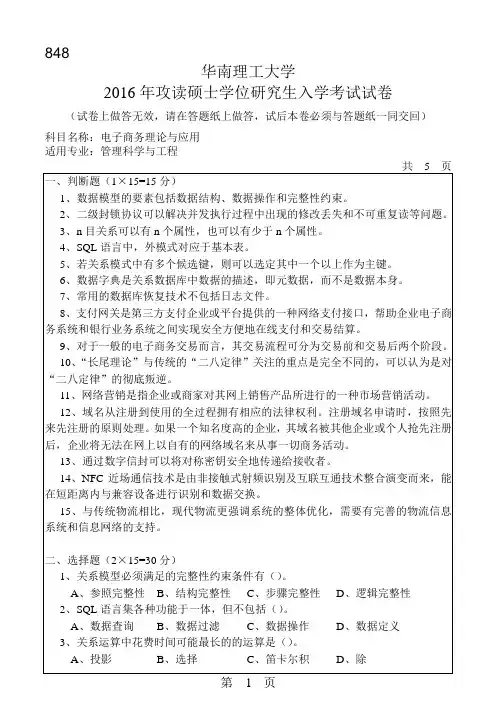
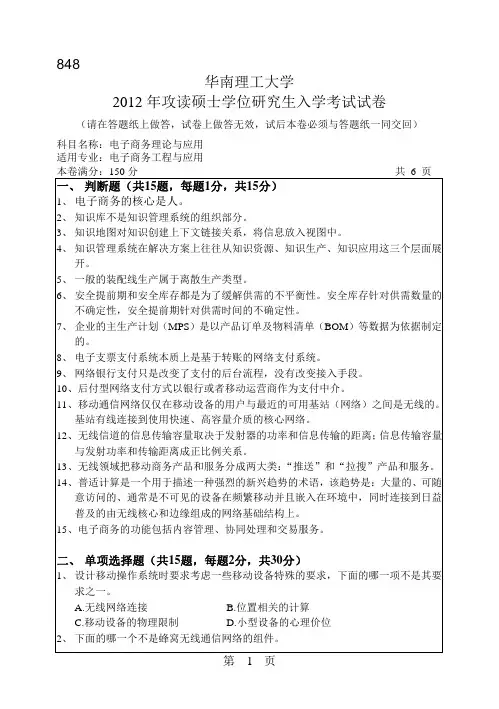
848华南理工大学2012年攻读硕士学位研究生入学考试试卷(请在答题纸上做答,试卷上做答无效,试后本卷必须与答题纸一同交回)科目名称:电子商务理论与应用适用专业:电子商务工程与应用本卷满分:150分共 6 页一、 判断题(共15题,每题1分,共15分)1、电子商务的核心是人。
2、知识库不是知识管理系统的组织部分。
3、知识地图对知识创建上下文链接关系,将信息放入视图中。
4、知识管理系统在解决方案上往往从知识资源、知识生产、知识应用这三个层面展开。
5、一般的装配线生产属于离散生产类型。
6、安全提前期和安全库存都是为了缓解供需的不平衡性。
安全库存针对供需数量的不确定性,安全提前期针对供需时间的不确定性。
7、企业的主生产计划(MPS)是以产品订单及物料清单(BOM)等数据为依据制定的。
8、电子支票支付系统本质上是基于转账的网络支付系统。
9、网络银行支付只是改变了支付的后台流程,没有改变接入手段。
10、后付型网络支付方式以银行或者移动运营商作为支付中介。
11、移动通信网络仅仅在移动设备的用户与最近的可用基站(网络)之间是无线的。
基站有线连接到使用快速、高容量介质的核心网络。
12、无线信道的信息传输容量取决于发射器的功率和信息传输的距离;信息传输容量与发射功率和传输距离成正比例关系。
13、无线领域把移动商务产品和服务分成两大类:“推送”和“拉搜”产品和服务。
14、普适计算是一个用于描述一种强烈的新兴趋势的术语,该趋势是:大量的、可随意访问的、通常是不可见的设备在频繁移动并且嵌入在环境中,同时连接到日益普及的由无线核心和边缘组成的网络基础结构上。
15、电子商务的功能包括内容管理、协同处理和交易服务。
二、 单项选择题(共15题,每题2分,共30分)1、设计移动操作系统时要求考虑一些移动设备特殊的要求,下面的哪一项不是其要求之一。
A.无线网络连接B.位置相关的计算C.移动设备的物理限制D.小型设备的心理价位2、下面的哪一个不是蜂窝无线通信网络的组件。
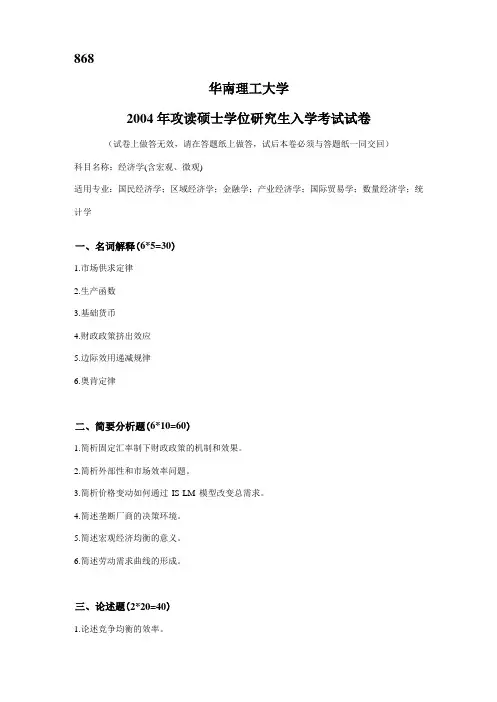
868华南理工大学2004年攻读硕士学位研究生入学考试试卷(试卷上做答无效,请在答题纸上做答,试后本卷必须与答题纸一同交回)科目名称:经济学(含宏观、微观)适用专业:国民经济学;区域经济学;金融学;产业经济学;国际贸易学;数量经济学;统计学一、名词解释(6*5=30)1.市场供求定律2.生产函数3.基础货币4.财政政策挤出效应5.边际效用递减规律6.奥肯定律二、简要分析题(6*10=60)1.简析固定汇率制下财政政策的机制和效果。
2.简析外部性和市场效率问题。
3.简析价格变动如何通过IS-LM 模型改变总需求。
4.简述垄断厂商的决策环境。
5.简述宏观经济均衡的意义。
6.简述劳动需求曲线的形成。
三、论述题(2*20=40)1.论述竞争均衡的效率。
2.论长期经济增长的因素。
四、计算题(1*20=20)假定某完全竞争的行业中有100家完全相同的厂商,每个厂商的成本函数为:TC=0.1Q2+Q+10,成本用美元计算。
1.求市场的供给曲线。
2.如果市场的需求函数为Q d= 4000 - 400P,求市场的均衡价格。
3.如果对每单位产品征税0.9 美元,那么新的市场均衡价格和产量又为多少?868华南理工大学2005年攻读硕士学位研究生入学考试试卷(试卷上做答无效,请在答题纸上做答,试后本卷必须与答题纸一同交回)科目名称:经济学(含宏观、微观)适用专业:国民经济学;区域经济学;金融学;产业经济学;国际贸易学;数量经济学;统计学一、名词解释(6*5=30)1.替代效应2.沉没成本3.自然垄断4.GDP5.固定汇率制6.公司治理结构二、问答题(6*10=60)1.市场机制的局限性是什么?2.如何理解储蓄?体现它的形态有哪些方式?3.凯恩斯的货币需求主要由哪些因素决定?4.国际收支平衡的条件是什么?并用数学方程表出。
5.决定一国经济长期增长的因素有哪些?6.宏观经济总需求由哪几个部分构成?三、论述题(2*20=40)1.用边际效用递减理论论述收入再分配的合理性。
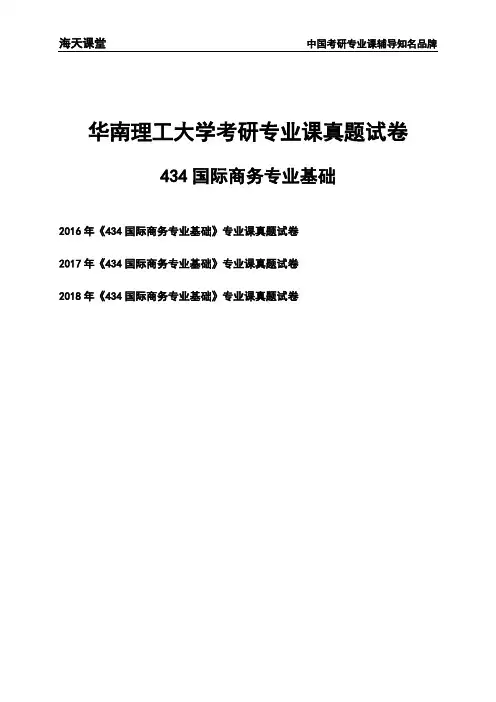
862华南理工大学2018年攻读硕士学位研究生入学考试试卷(试卷上做答无效,请在答题纸上做答,试后本卷必须与答题纸一同交回)科目名称:电子技术基础(含数字与模拟电路)适用专业:声学;光学;物理电子学;微电子学与固体电子学;生物医学工程;集成电路工程(专硕);生物医学工程(专硕)图1管的特性相同,所有晶体管的β均相同,R C1。
图2图3。
设集成运放为理想运放。
图4 )该电路等效成差分放大电路中四种接法中的哪一种?)输入电阻和输出电阻各为多少?图5的函数式,并化简为最简与或式。
图6分)用卡诺图化简法将下列逻辑函数化为最简与或形式,根据化简结果画出用与非门实现的逻辑电路图。
++++'''''''''''AD A B D A B C D AB C D A BC D∑=+C D m d,,)(2,3,5,7,8,11)(0,1,10,15)图7九、(12分)分析图8所示电路,写出驱动方程,状态方程和输出方程,画出状态转换图,说明电路是否能自启动。
图8(12分)用JK触发器(图9(a))及必要的门电路设计时序电路,要求实现图)所示状态转换关系的5进制计数器。
写出设计过程,画出逻辑电路图。
图9(a)图9(b)十一、(12分)用8选1数据选择器74HC151产生逻辑函数Z AC BD=+。
74HC151的图形符号如图10。
在控制输入端'0S=时,74HC151的输出如下:图1011是555定时器接成的延时报警器。
当开关S断开后,经过一定延迟时间后扬声器开始发出声音。
如果在延迟时间内S重新闭合,图11862华南理工大学2017年攻读硕士学位研究生入学考试试卷(试卷上做答无效,请在答题纸上做答,试后本卷必须与答题纸一同交回) 科目名称:电子技术基础(含数字与模拟电路) 适用专业:声学;光学;生物医学工程(理学);物理电子学;微电子学与固体电子学;生物医学工程(工学);集成电路工程(专硕);生物医学工程(专硕)的同向输入端和反向输入端;题1图的电流放大系数分别为β1~β5,b-e 间动态电题2图 )画出微变等效电路 ;(2)T3的作用是什么?)写出各级电路的放大倍数表达式,和整个电路的u i A R ,和o Ru A (1j =+A ,,um L H f f 题4图(a) (b)(c )题5图6. (12分)有三个开关安装在一个房间的三个位置,用于控制同一盏电灯,设计一个逻辑电路,要求改动任何一个开关的状态都能控制电灯由亮变灭或由灭变亮。
434
华南理工大学
2016年攻读硕士学位研究生入学考试试卷
(试卷上做答无效,请在答题纸上做答,试后本卷必须与答题纸一同交回)
科目名称:国际商务专业基础
适用专业:国际商务(专硕)
434
华南理工大学
2017年攻读硕士学位研究生入学考试试卷
(试卷上做答无效,请在答题纸上做答,试后本卷必须与答题纸一同交回)
科目名称:国际商务专业基础
适用专业:国际商务(专硕)
434
华南理工大学
2018年攻读硕士学位研究生入学考试试卷
(试卷上做答无效,请在答题纸上做答,试后本卷必须与答题纸一同交回)
科目名称:国际商务专业基础
适用专业:国际商务(专硕)。
电子商务黄敏学版习题答案一、合同背景华南理工大学(以下简称“甲方”)与某技术服务公司(以下简称“乙方”)在平等、自愿、公平、诚实信用的原则基础上,根据《中华人民共和国合同法》等相关法律法规的规定,就甲方向乙方提供技术服务事宜,经友好协商,达成以下协议:二、服务内容1、乙方应按照甲方的要求,提供以下技术服务:(1)对甲方的硬件设备进行维护和升级;(2)为甲方开发一套新的软件系统;(3)对甲方的网络系统进行优化和升级;(4)为甲方提供IT培训服务。
2、乙方应按照甲方的要求,在规定的时间内完成上述服务,并保证服务质量符合甲方的要求。
三、服务期限本合同的服务期限为一年,自双方签字盖章之日起计算。
四、费用及支付方式1、甲方应按照以下方式向乙方支付技术服务费用:(1)硬件设备维护和升级费用:人民币壹佰万元;(2)软件开发费用:人民币贰佰万元;(3)网络系统优化和升级费用:人民币叁佰万元;(4)IT培训服务费用:人民币肆佰万元。
2、甲方应在合同签订后五个工作日内,向乙方支付第一笔技术服务费用,即人民币壹佰万元。
3、甲方应在硬件设备维护和升级、软件开发、网络系统优化和升级、IT培训服务完成后五个工作日内,向乙方支付剩余的服务费用。
五、保密条款1、双方应对本合同的全部内容及涉及的商业秘密和敏感信息进行保密。
未经对方书面同意,任何一方不得向第三方透露或使用上述信息。
2、若因法律法规规定或司法程序要求,一方必须披露保密信息,该方应事先通知对方,并协助对方采取适当的措施保护对方的保密权益。
六、违约责任1、若乙方未按照合同约定提供服务,甲方有权要求乙方承担违约责任,并支付违约金。
若违约金不足以弥补甲方损失的,乙方还应承担赔偿责任。
2、若甲方未按照合同约定支付服务费用,乙方有权要求甲方承担违约责任,并支付违约金。
若违约金不足以弥补乙方损失的,甲方还应承担赔偿责任。
七、争议解决方式本合同的履行过程中如发生争议,双方应首先友好协商解决;协商不成的,任何一方均有权向合同签订地的人民法院提起诉讼。
-m2 V 1 .线温等为CG线 虚 中图’hu la-'P Lw h -G R 俨l i l --L rn Ef $4过Ch !-OL W ’r E’1程 判是Md 川热吸 口玉 咄L 还’过 体- 线热气 ,肉强 吸 阳山 l 姥 色 刷 拙J :i线 柑川 机川川执…M热勾 虚 两 这 断 · 队 放 但 吸 F F 吸 程中 惆 热程 程 放 叩2阳-1 .860华南理工大学2018 年攻读硕士学位研究生入学考试试卷( 试卷上做答无效 ,请在答题纸上做答 ,试后本卷必须与答题纸一同交回〉 。
d科目名称 :普通物理(含力 、热、电、光学) 适用专业 :理论物理:凝聚态物理 :声学:光学;材料科学与工程 :物理电子学 :共 f 页 。
;7' v材料工程(专硕)一、选择题 (共 48 分,每题 4 分〉l 、几个不同倾角的光滑斜面 ,有共同的底边 ,顶点也在同一坚直面上 .若使一物倒( 视为质点) 从斜面上端由静止滑到下端的时间最短 ,则斜面的倾角应选(A) 60。
. (B) 45° . (C) 30。
.(D) 15。
.[]2、某物体的运动规律为 d v / d t = -k v 勺 ,式中的 k 为大于零的常量 .当t = O 时,初速为 Vo ,则速度 U 与时间 t 的函数关系是(D) abc 过程和 def 过程都放热. []6、一定量的理想气体经历 二cb 过程时吸热500 J. 则经历 cbda 过程时 ,吸热为(A ) 马200 J. (B ) 一700 J.p (×105 Pa)(A) v=kt 2 叫(C) -400 J .(D) 700 J.。
V ( 10-3 m3)1 kt2 1(C) 一=--::-- +一’ , U 二L Vo3、一质量为 m 的质点,在半径为 R 的半球形容器中 ,由静止开始自边缘上的 A 点滑 下,到达最低点 B 时,它对容器的正压力为N. 则质点自 A℃!57[ ]47、一铜板厚度为 D= l .OO mm ,放罩在磁感强度为 B= 1.35 T 的匀强磁场中,磁场方|向垂直于导体的侧表面 ,如图所示 ,现测得铜板上下两面电势差为 V=1.10×10 5 v ,己B 知铜板中自 由电子数密度 n =4.20 ×102s m 3, 滑到 B 的过程中,摩擦力对其作的功为A(A) 护(N 训 电子电荷 e=l.60 ×10-19 c,则此铜板中的电 歹争叶阳一mg ) .(D)i R( N 切)[]8、如图所示 .一电荷为 q 的点电荷,以匀角速度ω作圆周 运动 ,圆周的半径为 R. 设 t = O 时 q 所在点的坐标为 xo = R , 4、如图,两木块质量为 m1 和 叫,由一轻弹簧连接,放在光滑水平桌面上 ,先使网木块靠近而将弹簧压紧 ,然后由静止释放 .若在弹簧伸长到原长时,m1 的速率为 V1,则弹簧原来在压缩状态时所具有的势能是o = O ,以T , ] 分别表示 x 轴和 y 轴上的单位矢景 ,则圆心处 点的位移电流密度为 :1 m1 + m2 2总 二点点达-2.口._L 二sm w t Iqw『x(i )(A) 一m 1V12(B) (A)(B)一一一τcos mt J2 m1 4 π R 24πRqw -qw-1 m1 + m2 z(C)一一k(D)一 丁(sin wti - c os mtj) (C)三(m1 + m2 ) V 1 .(D ) -m1V 1 . 4πR 22 m24πR第页第 2 页\Y i u )-E Er 饨A ~「, D G的一市民川r E F图nu 品UF 历经。